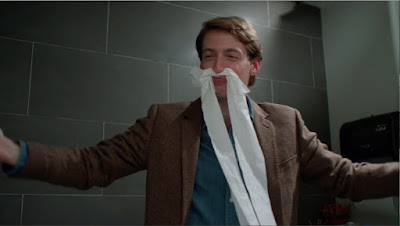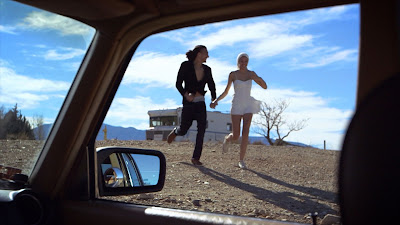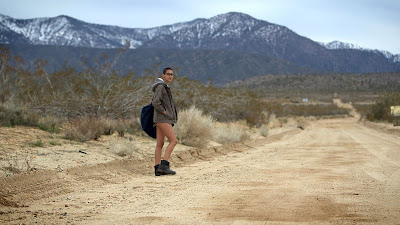...and he runs with it like crazy. Mr. Ritter's is the best performance from an actor I've seen this year, and if the storied Academy members ever deigned to really look at small indie movies in the way they should, fit praise would be forthcoming around "Oscar" time. Don't get too hopeful; remember how they treated last year's best actress, Rebecca Hall in Christine. Meanwhile, take a chance on the unusual new movie entitled BITCH, written and directed by Marianna Palka, who also co-stars. Back in 2008 Ms Palka gave us the very fine Good Dick, also starring Mr. Ritter, and her new film is even better: stronger, original and hugely surprising.
Palka, above, plays a put-upon housewife named Jill Hart who is literally suicidal when we first meet her. At first we imagine this is due to her clueless and unfaithful hubby, Bill Hart (played by Ritter, below) and her four (count' em!) kids who we assume are the sort of impossible, narcissistic brats driving their mom 'round the bend. But things are not quite so simple. Note the dog outside their house who barks constantly, and with whom Jill may be identifying.
And, no, this is not a 21-Century update on that popular TV show, Hart to Hart. What happens here may be about as strange as American indie movies get, and yet on even a realistic level, Bitch never quite leaves the realm of the possible -- if the hugely unconventional and bizarrely, brazenly ugly. TrustMovies is not going to go into plot detail because viewers deserve to experience what happens here -- and then decide why it happens -- on their own. I'll just say that Ms Palka has been awfully brave and ballsy in her choices.
First off, she cedes the film's most important role to Ritter, who makes an absolute meal of it. From his early and very funny scenes as the self-involved, utterly clueless husband from hell to the movie's mid-section as his character falls screechingly apart (above) to the finale in which Bill begins to change, this is first-class movie-making in both conception and execution, as well as superior performing. Palka herself does a remarkable job as the titular bitch. This kind of performance is something you will not have previously seen, and yet it is also clearly a supporting role.
Also giving fine support are Jamie King, above, left, as Jill's sister, and Brighton Sharbino, Rio Mangini, Kingston Foster and Jayson Maybaum as her four children -- all of whom turn out to be more caring and helpful that we would have initially imagined. So what's the big problem? Sure, feminism rises to the surface here, but not at all in the manner we most often see it. The key lies in the relationship between husband and wife, and how this unfurls is near-miraculous in terms of original and surprising movie-making.
There is a speech given somewhat past the halfway mark that is so succinct and devastating in terms explaining the care and effort a woman brings to a marriage that hearing it should make many of us ex- and/or present husbands cringe in recognition and guilt.
Bitch is finally a love story, and considering what has come before, what occurs subsequently seems doubly moving, rich and profound. Yours truly was in unexpected tears toward the end. As much as anything he has seen in a long while, Palka's film raises and then gives a very possible answer to Freud's famous question, What does a woman want?
From Dark Sky Films and running 93 minutes, the movie opens this Friday, November 10, in New York City (at the Village East Cinema), in Chicago on Friday, November 17 (at the Facets Cinémathèque) and on November 24 in Los Angeles (at Laemmle's Music Hall 3), as well as in a number of other cities across the country this week and those following. Click here then scroll down to see (some of the) currently scheduled playdates, cities and theaters (perhaps Dark Sky will want to update this list soon so that the Los Angeles opening is added).



























































